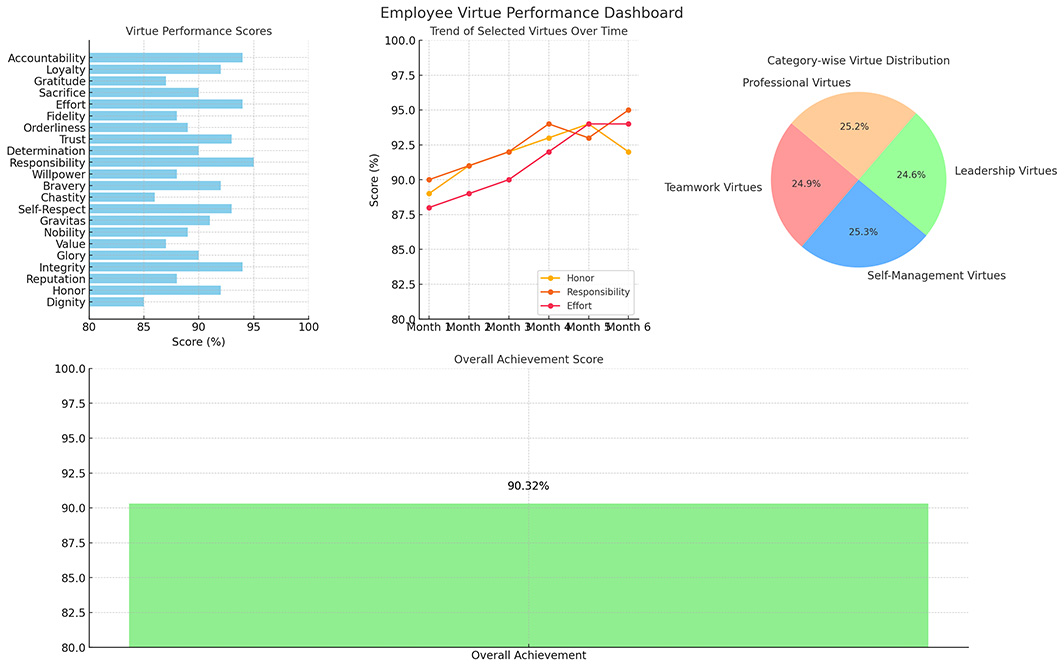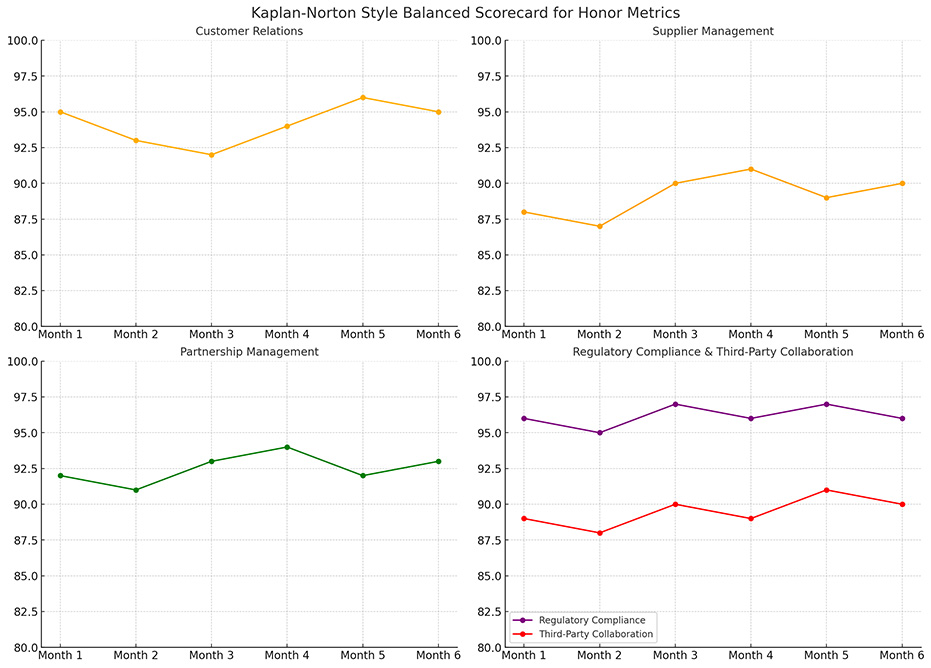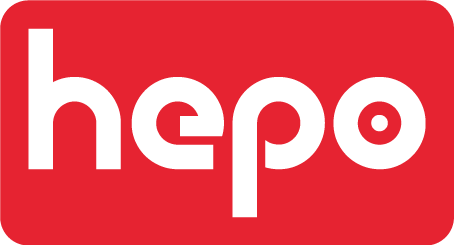The Case of Honor : Translating Human Virtues into Corporate Assets

At HEPO, we believe that human virtues like
Honor are more than ethical ideals—they are measurable, actionable assets that
drive organizational success. Here’s how we transform Honor into a tangible
corporate value:
Understanding Honor in a Corporate Context
In its essence, Honor means standing by
your team, supporting colleagues in challenges, and ensuring collective
success. It’s about collaboration, responsibility, and resilience in the face
of difficulties. In the workplace, this virtue manifests as an employee's
willingness to:
Share responsibility within a team.
Actively contribute to group goals.
Support teammates in overcoming obstacles.
Measuring and Tracking Corporate Honor
HEPO uses advanced tools to evaluate Honor
through both qualitative and quantitative metrics. For example:
Task and Project Contribution:
We track individual assignments within
projects and evaluate the completion rate, quality, and timeliness of their
work.
The employee's involvement in team tasks
and collaborative efforts is scored, showing how much they contribute to shared
goals.
Team Engagement Metrics:
Participation in follow-ups, meeting notes,
and action items are monitored to gauge how consistently an employee supports
the team.
Completion of team-driven goals versus
individual tasks reflects their alignment with collective objectives.
Communication Insights:
With the help of AI-powered tools, such as
OpenAI’s natural language processing capabilities, we analyze the tone and
language used in meetings and written communication (emails, chat messages,
etc.).
Positive indicators of Honor include
empathetic and constructive communication, offers to help, and proactive
conflict resolution.
How This Becomes a Corporate Asset
When Honor is quantified and tracked, it
provides organizations with actionable insights:
Team Synergy: Employees with high scores in
Honor strengthen team cohesion and boost overall productivity.
Leadership Potential: Honor scores can
highlight individuals ready to take on leadership roles, as they consistently
demonstrate support and accountability.
Performance Insights: By analyzing Honor
alongside other virtues, managers can identify strengths and areas for
improvement, enabling tailored professional development.
For example, if an employee’s Honor score
is consistently high, it signals their ability to collaborate and lead
effectively under pressure—making them a key asset in high-stakes projects or
cross-functional initiatives.

Tracking Corporate Honor in External Interactions
Honor extends beyond internal team dynamics
to the way employees represent the organization in dealings with external
parties. HEPO captures and evaluates this through various touchpoints:
1. Customer Interactions
Definition of Honor: Honor in customer
relations is demonstrated by consistently delivering on promises, resolving
issues proactively, and treating customers with respect and empathy.
How HEPO Tracks It:
Customer Feedback Analysis: HEPO integrates
feedback tools to gather insights from customer surveys, complaint resolutions,
and satisfaction ratings. Indicators include acknowledgment of issues, timely
resolution, and empathetic communication.
Follow-Up Records: Employees who diligently
follow up with customers on their concerns, provide updates, and ensure
satisfactory outcomes score higher in Honor.
Sentiment Analysis: OpenAI-powered tools
analyze the tone and sentiment in emails, chats, and customer service calls to
gauge respectfulness, sincerity, and a solutions-oriented mindset.
2. Supplier Relations
Definition of Honor: In supplier
interactions, Honor involves fair dealings, fulfilling contractual obligations,
and fostering trust through clear communication and prompt payments.
How HEPO Tracks It:
Contract Fulfillment Monitoring: HEPO
tracks adherence to agreed terms, such as timely delivery of orders or fair
negotiations during pricing discussions.
Supplier Feedback Metrics: HEPO collects
data from supplier reviews or periodic surveys, capturing their trust in the
organization’s fairness and dependability.
Collaboration Metrics: Employees’ efforts
in creating long-term, win-win relationships—like resolving disputes amicably
and ensuring smooth collaboration—are monitored and quantified.
3. Partner Organizations
Definition of Honor: Demonstrating Honor in
partnerships means upholding commitments, sharing resources transparently, and
ensuring mutual success.
How HEPO Tracks It:
Meeting Records and Follow-Ups: Employees
who actively contribute to joint initiatives, maintain open communication, and
address partner concerns score high in Honor.
Performance Against KPIs: HEPO tracks
whether employees meet partnership-specific milestones (e.g., co-marketing
campaigns, joint ventures) while maintaining transparency and ethical behavior.
Language and Tone Monitoring: OpenAI tools
analyze the tone of collaboration emails and meeting notes to ensure partners
are treated with respect and equitable consideration.
4. Government and Regulatory Bodies
Definition of Honor: Honor in this context
is about complying with regulations, ensuring transparency in reporting, and
addressing inquiries professionally.
How HEPO Tracks It:
Compliance Adherence: HEPO integrates
compliance modules that monitor whether employees are meeting deadlines for
regulatory filings and fulfilling legal obligations without errors or
omissions.
Audit and Reporting Quality: Honor is
reflected in the accuracy and professionalism of reports submitted to
government bodies, tracked through audit trails and validation checks in HEPO.
Interaction Tone Analysis: Communications
with regulators are analyzed for professionalism, respectfulness, and clarity.
5. Third-Party Manufacturers and Delivery Partners
Definition of Honor: Ensuring fair
treatment, timely updates, and consistent support for third-party partners
defines Honor in this area.
How HEPO Tracks It:
Task and Process Timeliness: HEPO evaluates
whether employees coordinate effectively with manufacturers and logistics
partners, ensuring timely approvals and payments.
Dispute Resolution Records: Cases of
dispute or delay are analyzed for the employee’s role in finding solutions
collaboratively, ensuring fairness.
Operational Feedback Integration: Metrics
like on-time delivery rates and feedback from delivery partners reflect how
well employees honor commitments and foster trust.
Example in Action
An employee managing a supplier might:
Respond promptly to supplier queries,
ensuring clarity in communication.
Resolve issues around delayed payments by
proactively liaising with finance teams.
Negotiate contract renewals in a manner
that reflects mutual respect and fairness.
HEPO would track:
The frequency and timeliness of responses
logged in communication tools.
Supplier feedback ratings, collected
through periodic reviews.
The sentiment and tone of emails analyzed
by AI-powered sentiment tools.
This data is aggregated into an Honor score
that reflects the employee’s ability to maintain fair, trustworthy
relationships with external stakeholders.
Why This Matters
By quantifying Honor across these
dimensions, HEPO enables organizations to:
Strengthen Relationships: Build lasting
partnerships and trust with customers, suppliers, and other stakeholders.
Enhance Accountability: Ensure employees
are measured not just on output but on the values they bring to external
interactions.
Promote Ethical Conduct: Encourage
fairness, transparency, and respect in all business dealings, reinforcing the
organization’s reputation.
By tracking and fostering virtues like
Honor, HEPO helps businesses build a culture of collaboration and mutual
support. This isn’t just about ethics—it’s about creating an environment where
teamwork thrives, challenges are met collectively, and organizational goals are
achieved with integrity.
